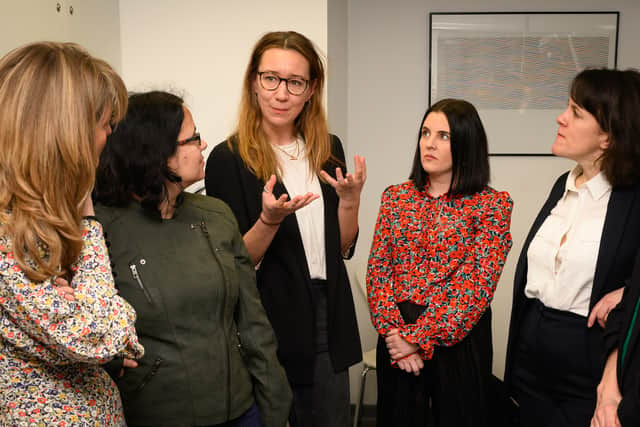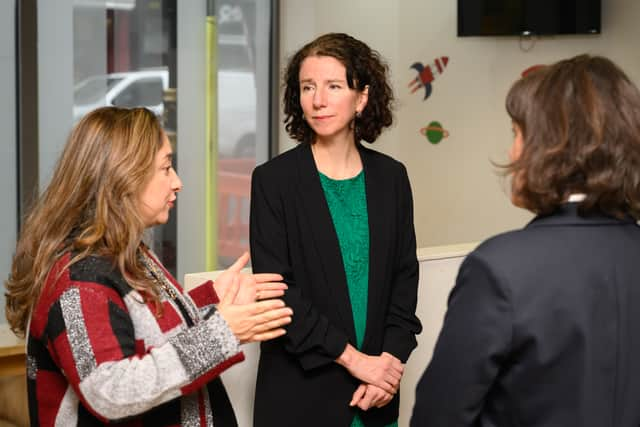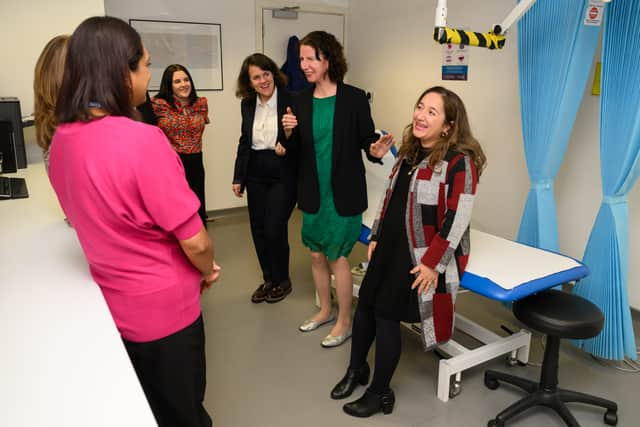Cervical screening ‘crisis’: London has lowest take up in England, Labour says
and live on Freeview channel 276
Cervical screening rates in London are in “crisis” and women’s health has been “completely deprioritised”, the Labour Party has warned.
Analysis of NHS cervical screening data reveals London is lagging behind the rest of England with smear test rates below 50% in some inner areas of the capital.
Advertisement
Hide AdAdvertisement
Hide AdAnneliese Dodds, shadow women and equalities secretary, said: “The Conservatives have completely deprioritised women’s health in a way that could store up serious problems.”
Cervical Cancer Prevention Week ran from January 23-29 and Labour has demanded the government take urgent action.
Shock health data has shown:
- Screening rates are below 70% nationwide, down from 75.7% in 2010/11;
- Levels are especially low in London with only 62% of women up to date in 2021/22;
- The downward trend is continuing into 2022/23, with London at 61% April-June 2022;
- Under half of eligible women in Chelsea and Westminster are up to date with smears.


The NHS national target is 80% of eligible women being up to date with their screening - which not a single borough in England achieved in 2021/22.
Ms Dodds warned: “Regular screening is an essential way to prevent women going on to develop cervical cancer.
Advertisement
Hide AdAdvertisement
Hide Ad“The Conservatives have completely dropped the ball on cervical screening over the past decade and urgently need to wake up to this growing problem for women’s health.”
In Kensington and Chelsea, just under 46% of women are considered up to date with their cervical smears - the lowest rates in London.
Westminster came in second in the capital with coverage at just under 47%.
While Camden had a rate of just above 50% and Hammersmith and Fulham and Tower Hamlets had between 51% and 53%.
Advertisement
Hide AdAdvertisement
Hide AdLoading....
Islington, Brent, Newham, Harrow and Barnet completed the 10 boroughs with the lowest rates with around 56%, 59%, 60%, 61% and 62% coverage.
Cervical screening was on a downward trajectory even before the pandemic, Labour says.
In 2020, NHS data shows rates were already down to 72% nationally and 64.7% in London.
Ms Dodds’ comments came during a visit to Victoria Medical Centre, in Westminster, with shadow public health minister Feryal Clark.
Advertisement
Hide AdAdvertisement
Hide Ad“Labour will reform the health service to make it fit for the future and train 7,500 more doctors and 10,000 more nurses and midwives a year,” she pledged.
She added: “[This will be] paid for by abolishing the non-dom tax status which allows wealthy people living in Britain to pay their taxes overseas.”


A Department of Health and Social Care (DHSC) spokesperson said: “A cervical cancer diagnosis can be devasting but by increasing the number of people who attend cervical screening and take up the HPV vaccination when invited, including in London, we can find cancers earlier when they are more treatable and prevent many of them entirely.
“We are taking action by expanding the number of settings for cervical screening, as well as making appointments available during evenings and on weekends in some areas. Through the cervical screening programme, an estimated 5,000 lives a year are saved by detecting HPV which abnormalities of the cervix early and referring women for effective treatment.”
Advertisement
Hide AdAdvertisement
Hide AdWhat is a smear test and how does cervical screening work?
Women and people with cervixes should go for a smear test every three and a half years, if they are between 25 and 49, and every five and a half years, if aged between 50 and 64.
The screening checks the health of your cervix - the womb opening from the vagina.
It does not test for cancer, but looks for viruses which could cause cell changes in the future.
During an appointment with a nurse or doctor, a small sample of cells is taken from the cervix, the NHS says.
Advertisement
Hide AdAdvertisement
Hide AdThe sample is checked for strains of human papillomavirus (HPV), known as “high risk HPV”.
If these types of HPV are not found, you do not need any further tests. But if they are present, the sample is then checked for any changes in the cells of your cervix.
These can then be treated before they get a chance to turn into cervical cancer.
The nurse or doctor will tell you when you can expect your results letter.
Advertisement
Hide AdAdvertisement
Hide AdWhat does the NHS say?
Dr Kiren Collison, a GP and NHS interim primary care medical director, said: “We have made great progress on our cervical screening programme and the combined effects of the HPV vaccine and the new, more sensitive way of screening for cervical cancer means that we have the opportunity to eliminate cervical cancer altogether.


“Having the potential to completely eradicate a disease that affects thousands of people every year is remarkable, but in order to do this, it is vital that people take up the offer of a test.
“So if you have received an invitation, or missed your last screening, don’t wait to make an appointment, put your health first and book an appointment with your GP practice or sexual health clinic today. Getting checked can save your life.”
National clinical cancer director Professor Peter Johnson, said: “Screening is an effective way to prevent cervical cancer developing or to catch it at a very early stage, which is why it is especially important that people attend their appointments.
Advertisement
Hide AdAdvertisement
Hide Ad“There are lots of reasons why somebody might not want to come forward – embarrassment, inconvenience, or uncertainty – but please speak to a healthcare professional if you are unsure.
“It’s also important to understand that HPV can remain undetected for many years before later going on to cause abnormal cells which can lead to cancer, so even if you’ve previously had a negative test, it is vital that you attend your next one.”
And women’s health minister Maria Caulfield said: “I have seen first hand through working as a nurse in a cancer unit how important it is to detect this cruel disease early and the NHS cervical screening programme is an vital way of detecting risk of and preventing cervical cancers.”
She added: “We’re improving the cervical screening process, including opening up 24/7 laboratory screening and expanding the locations options available – so people can get their results faster and their tests easier.
Advertisement
Hide AdAdvertisement
Hide Ad“I encourage those eligible to attend their potentially life-saving screening when invited.”
The NHS is also trialling self-screening for cervical cancer at home, with the results of that pilot set to inform whether it should be rolled out nationally. The HPV vaccine is also offered to all children aged 12 and 13 at school in Year 8, and up to 25 years through GP practices for those who may have missed vaccination in school, to protect against the most common types of HPV.
It is still important to attend a cervical screening appointment when invited because the HPV vaccine does not protect against all strains of HPV.
Cervical screening is available by appointment at local GP practices and at some local sexual health services.
For more information, visit the NHS website or speak to your GP.
Comment Guidelines
National World encourages reader discussion on our stories. User feedback, insights and back-and-forth exchanges add a rich layer of context to reporting. Please review our Community Guidelines before commenting.
